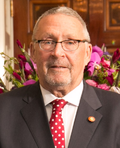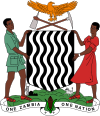| Vice-President of the Republic of Zambia | |
|---|---|
 Coat of arms of Zambia | |
| Style |
|
| Abbreviation | VP |
| Term length | 5 years, renewable once |
| Inaugural holder | Reuben Kamanga |
| Formation | October 1964 |
| Salary | 43,800 USD annually [1] |
| Website | Official website |
 |
|---|
The vice-president of Zambia is the second highest position in the executive branch of the Republic of Zambia. The vice-president was previously appointed by the president before the amendment of the Constitution in 2016. [2] Under the amended Constitution, when the president dies, resigns or is removed from office, the vice-president automatically assumes the presidency, unlike when the Constitution demanded holding of presidential by-election within 90 days. [3] This is so because now every presidential candidate shall pick a vice-presidential running mate and the two will share the vote meaning voting for a president is an automatic vote for the vice-president.
Contents
The vice-president also heads the Office of the Vice-President, a government ministry, and is also automatically a member of the National Assembly.
Rupiah Banda became acting president on 19 August 2008 following the death of President Levy Mwanawasa, while Guy Scott became acting president 28 October 2014 following the death of President Michael Sata. Banda was elected president in the subsequent election, and Scott did not stand.










